 My wife and I have a tradition of writing a letter to our children when they are baptized. Here is the letter we wrote for our daughter Lois on her baptism, June 28, 2009.
My wife and I have a tradition of writing a letter to our children when they are baptized. Here is the letter we wrote for our daughter Lois on her baptism, June 28, 2009.Dearest Lois,
You are sleeping quietly in your bassinet as I write this. Tomorrow you will be baptized. Baptism is a holy sacrament. What is a sacrament you ask? A sacrament is a sign. Tomorrow Pastor Joshua Lee will sprinkle water over your head. This water is a sign of your death and resurrection in Christ (Romans 6:4).
Lois, your baptism shows you that you belong to Jesus. He lived the life of perfect obedience, devotion to God, and love for his neighbors that you could never live because you have a sinful nature. You were born guilty. You are your father's and mother's daughter. We are guilty sinners too. We come from a long line of guilty sinners say back to the first father and mother. But God rescued us by sending us Jesus. When Jesus died for our sins, he died not only as the perfect human being. He died also as God. In his one death, he paid for all the sins of his people: past, present, and future. When Jesus rose from the dead, he rose not only as God, but also as our Savior to give us eternal life.
Your baptism shows you that because Jesus died for you on the cross, you have already died with him. It has only been sixty days since you were born, but death has no power over you now. The sting of death is gone. Your death is in the past, nailed to a cross over 2,000 years ago. You have been buried with Christ. You can not die again.
Your baptism also shows you that because Jesus was raised from the dead by the glory of the Father, you have also risen with him in his resurrection. You are only two months old, but you can already taste the benefits of eternal life. Your life is hidden with Christ in God. You have been seated with Christ in the heavenlies.
A sacrament is also a pledge of God's Covenant of Grace. The water sprinkled over your head is God's promise that he will truly save you from all the guilt you ever feel, all the mistakes you ever make, all the misery you ever experience, all the troubles of this passing evil age, all for the sake of Jesus Christ. God's salvation is a free gift. He promises through baptism that it is yours only by believing in Jesus and turning away from your sins.
Some people only receive baptism after they have already come to fully understand and believe that Jesus is their Lord and Savior. God has come to you in this baptism before you could clearly understand or believe. It is a powerful reminder that you will not find your greatest hope within yourself, but outside yourself in God. God has been pleased to bring you up in a Christian home with two Christian parents who are deeply flawed and sinful but saved by his grace. Lois we pledge to love and nurture you as a precious daughter of the King of kings and Lord of lords. We will pray for you and with you. We will teach you from the Bible. We will share our faith in Christ with you through all of life's joys and sorrows. Today, you are also joining the Body of Christ. From this day forward you will always have a spiritual family in the Church. Beloved Lois, our greatest dream for you is that one day we will worship Jesus together with you in full sincerity and faith through all eternity.
Love,
Daddy and Mommy




